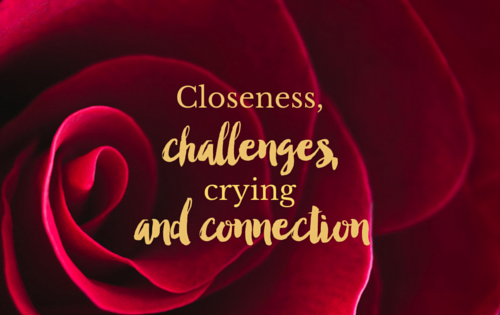Hello!
How are you?
Have you ever noticed that children often speak in code?
Because although sometimes, some children might say, “I’m feeling upset. Will you hold me whilst I cry and let out all my feelings of the day?”.
This isn’t the usual scenario.

Often, it goes a bit more like this:
We connect with them. We play together, we spend time focusing on them. We give them Present Time.
And then, a bit later on, or the next day, they do something like:
Do things they know we don’t want them to do;
They get really ‘whiny’ or ‘grumpy’ or they pick a fight with their brother.
They insist on having the blue cup that’s in the dishwasher.
They seem to have a big reaction to a small thing. And then we might think to ourselves, “But I gave her all that extra time and love, and now look!”
If we’re particularly frustrated, we might actually say something to them that we really don’t want to say.
But what happens if we reframe this?
We could see it like a pathway-
closeness -> crying -> connection
Only, often, along the way, in between closeness and crying, comes challenge!
Its because they are feeling connected with us that their more uncomfortable feelings come up to be heard and expressed.
And it happens with babies, children, teens and adults.

With Babies:
If our baby is crying, and all his needs are met, and we hold him in our arms, and look in his eyes, and tell him we love him, his crying is likely to intensify.
It doesn’t mean that he doesn’t like us.
It’s because he sees and feels our love, which helps him connect even more deeply with himself and what is going on for him.
And after crying in our arms, he is likely to feel calmer, and clearer, to sleep more peacefully and feel more relaxed in his body.

With Children:
Often after times of closeness, she will then have those more uncomfortable feelings bubbling up, and her feelings-system looks for a pretext to hang those feelings on.
That might be that her jumper isn’t the ‘right’ colour, or she gets harsh with her brother.
If we remember that she is needing a pretext to cry, rather than that she is being ‘deliberately difficult!’, it helps us pouring in the love and connection, and setting loving limits where necessary, so that she can have a big cry or tantrum.
And once she’s finished crying with our loving support, she is then likely to be very connected with us again.

With Teens:
If you saw in my recent email about my day out with my 14 year old daughter last week, you’ll have read about the deep connection that we had – and that by the end of the day we were laughing together, cracking jokes, and cuddling up on her bed.
A couple of days later, she was speaking in an agitated tone to me and her brother.
Unfortunately, I forgot what I am telling you now, and reacted to her. I’m grateful to say, that it still ended in healing tears.
She had a really big cry.
At times, in my arms.
At 14, she doesn’t cry often, so when she does, I always have the sense that she is crying tears that have been building up for quite a while.
Afterwards, she was chatty and joyful and loving and connected.

With Adults:
We are so similar too!
In so many of my workshops, I say to parents, “Have you ever been out on a very rare date night with your partner, and after half an hour of closeness, you end up having an argument?”
Often, again, when we know that we are receiving focused attention, our psyche will bring up uncomfortable feelings to release.
The thing is, just remembering that that is what is happening.
That’s they key.
If we remember that:
It’s not that our baby ‘hates it’ when we look at her;
It’s not that our child is ‘being difficult’ after Present Time;
It’s not that our teen is just being a ‘typical teenager’;
It’s not that our partner is ‘always making arguments’;
IT IS THAT they are just needing to be heard,
Then we are likely to be able to stay compassionate,
Stay connected,
Keep listening;
Set loving limits if necessary.
And see them come out the other side, close and calm and clear and connected!!!
I’d love to hear if this resonates for you!

And I have a reminder!
Here’s my free attachment play e-book.
Much love to you,
Marion xxxx





